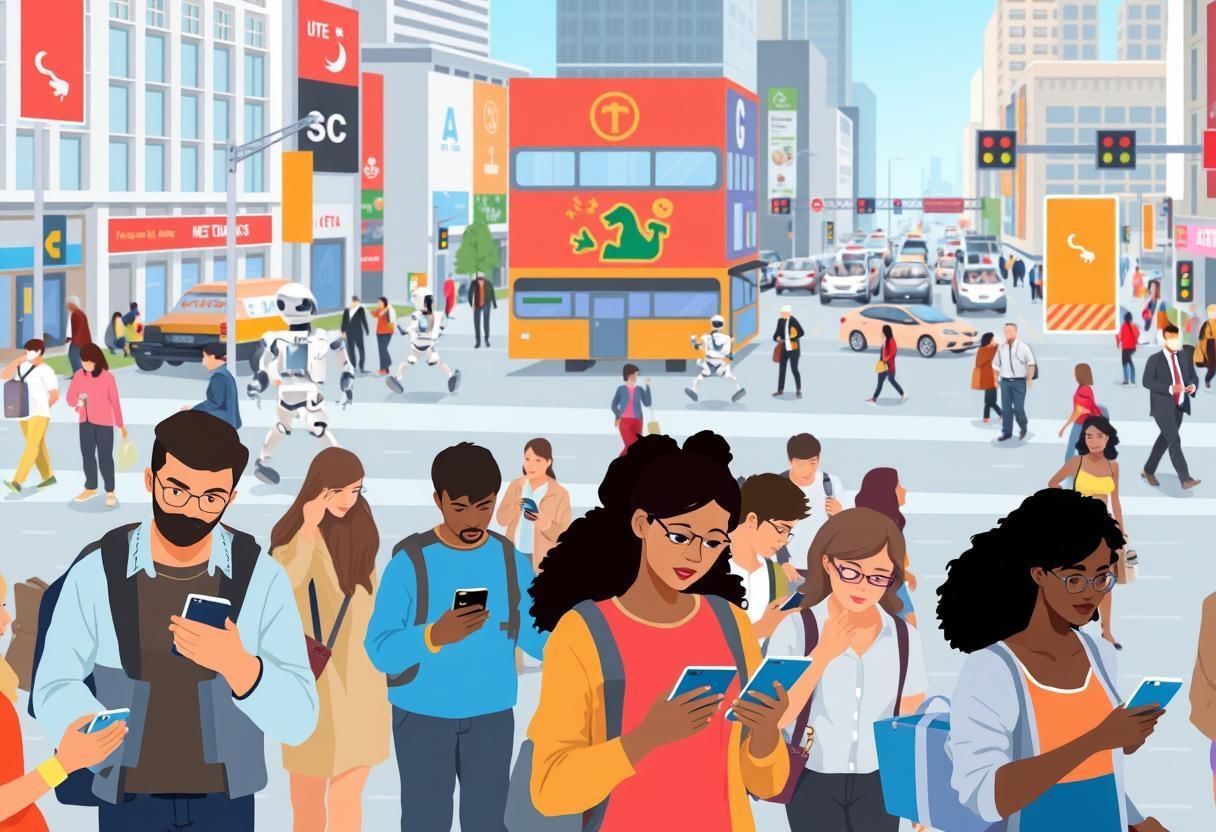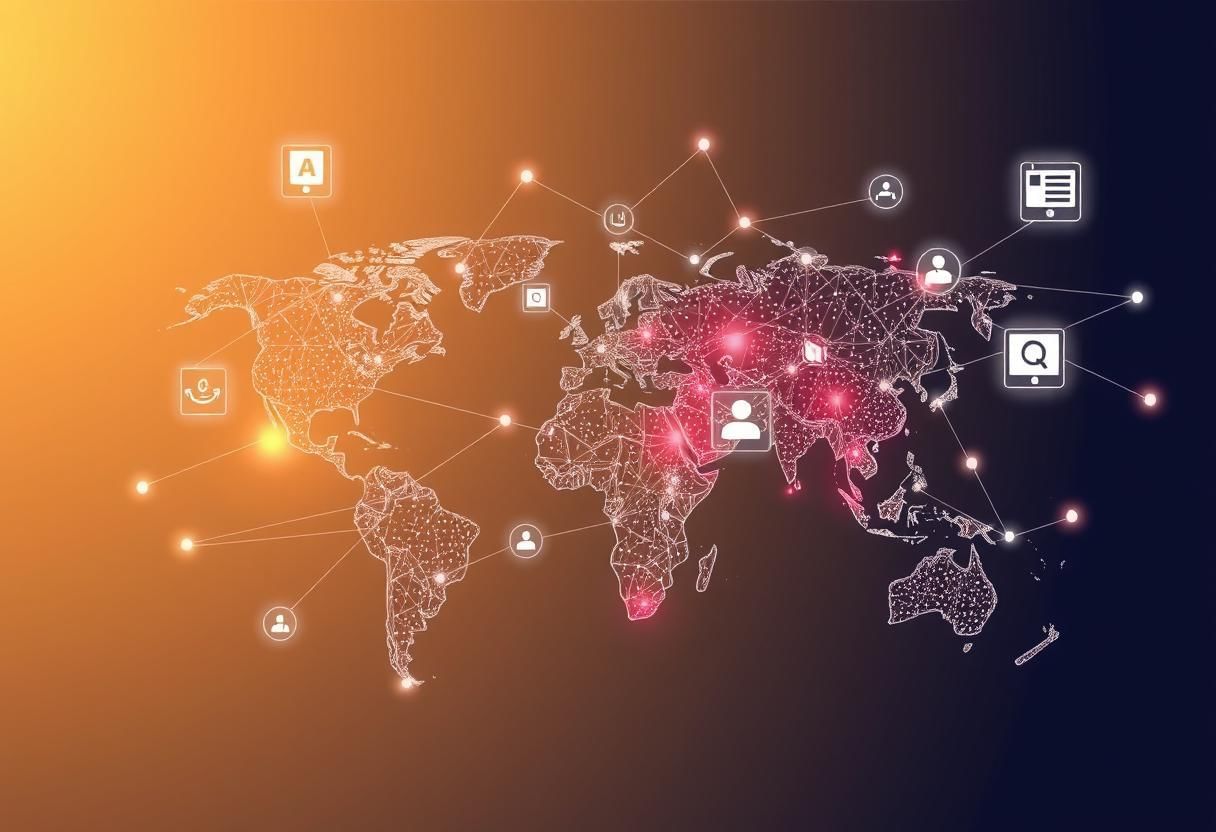Class 9 Exam > Class 9 Notes > Year 9 Computing IGCSE > Societal Impacts of IT – I
Societal Impacts of IT – I | Year 9 Computing IGCSE - Class 9 PDF Download
Introduction to the Societal Impacts of Information Technology
- Definition: The societal impacts of Information Technology (IT) refer to the effects that the widespread use of computer systems, the internet, and digital technologies have on individuals, communities, and societies at large.
- Importance: IT has brought about significant changes in how people live, work, and communicate. These changes have both positive and negative consequences, shaping the social, economic, and cultural aspects of society.
- Examples of IT Impacts:
- Communication through social media and instant messaging
- Access to education and healthcare via the internet
- Automation of jobs and industries
 Digital Transformation
Digital Transformation
Positive Impacts of IT on Society
Improved Communication
- Global Connectivity: IT has made communication faster, more efficient, and more accessible. The internet, email, and messaging apps allow people to communicate across the world instantly, breaking down geographic barriers.
- Social Media: Platforms like Facebook, Twitter, and Instagram allow people to share information, interact with others, and stay connected with friends, family, and global events.
- Video Conferencing: Tools like Zoom, Skype, and Microsoft Teams have made remote communication, meetings, and collaboration possible, even during global crises like the COVID-19 pandemic.
 Digital Education Hub
Digital Education Hub
Access to Information and Education
- Online Learning: IT has revolutionized education by providing online platforms for learning, offering courses, tutorials, and resources that are accessible to anyone with an internet connection.
- Digital Libraries and Resources: The internet has made vast amounts of information, research papers, eBooks, and tutorials easily accessible to students, professionals, and researchers worldwide.
- Distance Learning: IT tools enable people to study from home, access lectures online, and earn degrees remotely, expanding educational opportunities to people who otherwise may not have had access.
Enhanced Productivity and Automation
- Business Efficiency: IT has streamlined business processes through the use of enterprise software, accounting tools, customer relationship management (CRM) systems, and supply chain management tools.
- Automation: IT has enabled the automation of tasks in manufacturing, logistics, and service industries, improving efficiency and reducing costs.
- Smart Devices: Technology like smartphones, wearables, and home assistants (e.g., Alexa, Google Assistant) helps individuals and businesses manage tasks, time, and resources more effectively.
Negative Impacts of IT on Society
Privacy and Security Concerns
- Data Privacy: The collection of personal data by websites, social media platforms, and apps raises concerns about user privacy and the potential misuse of personal information.
- Cybersecurity: The rise of cybercrime, including hacking, identity theft, and online fraud, has made cybersecurity a major concern for individuals and organizations. Data breaches and cyberattacks can result in financial losses and reputational damage.
- Surveillance: Governments and companies increasingly use surveillance technologies to monitor individuals' online activities, raising ethical concerns about personal freedom and privacy.
 Digital Dilemmas
Digital Dilemmas
Social Isolation and Mental Health Issues
- Digital Addiction: Overuse of technology, especially social media, video games, and smartphones, can lead to addiction, social withdrawal, and mental health issues, including depression and anxiety.
- Impact on Relationships: The excessive use of IT for communication may lead to a reduction in face-to-face interactions, affecting personal relationships and family life.
- Cyberbullying: The anonymity of the internet has led to a rise in online bullying and harassment, particularly among teenagers, causing emotional harm and, in some cases, leading to self-harm and suicides.
Job Displacement and Economic Disparities
- Automation and Job Loss: As industries adopt automation and AI, many traditional jobs in sectors like manufacturing, retail, and customer service are being replaced by machines, leading to job displacement.
- Digital Divide: Not everyone has equal access to IT and digital resources. The digital divide between developed and developing nations, as well as between different socioeconomic groups, can exacerbate inequalities in education, employment, and economic opportunities.
- Technological Unemployment: While IT has created new job opportunities in sectors like software development, data analysis, and digital marketing, it has also led to the disappearance of certain jobs, leaving workers in traditional sectors vulnerable to unemployment.
Ethical Considerations in IT
Intellectual Property
- Definition: Intellectual property refers to creations of the mind, such as inventions, designs, and artistic works, that are protected by law.
- Copyright and Piracy: IT has made it easy to share and distribute digital content, but it has also led to widespread piracy, where intellectual property is stolen and distributed without permission, undermining the creators' rights.
- Patent Issues: Software patents and technology patents can lead to legal disputes over who owns the rights to a particular technology or idea.
Digital Ethics and Responsibility
- Digital Etiquette: As digital communication becomes more prevalent, there is a growing need for individuals to practice responsible online behavior, including respecting others' privacy and avoiding cyberbullying.
- Freedom of Information: The internet has allowed for the free flow of information, but ethical questions arise when it comes to controlling harmful or misleading content (e.g., fake news, hate speech, and misinformation).
- AI Ethics: As artificial intelligence plays an increasing role in decision-making, there are ethical concerns regarding transparency, fairness, bias, and accountability in AI systems.
Technology and Society: Future Outlook
The Role of Technology in Sustainable Development
- Smart Cities: IT plays a crucial role in creating smart cities, where technology is used to manage resources more efficiently, improve transportation, reduce waste, and enhance the quality of life for citizens.
- Environmental Impact: IT can contribute to sustainability by reducing the need for physical resources, supporting remote work, and facilitating green technologies like renewable energy and smart grids.
- Green Computing: The push for energy-efficient and environmentally friendly technology solutions is growing. This includes the development of low-energy devices, recycling of e-waste, and reducing the carbon footprint of data centers.
 Sustainable Innovation
Sustainable Innovation
Preparing for the Digital Future
- Digital Literacy: As IT becomes more integrated into everyday life, digital literacy is essential. People must develop the skills to use technology responsibly, critically evaluate information, and protect their privacy.
- Regulation of IT: Governments and organizations must create policies and regulations to ensure the ethical use of technology, protect privacy, and prevent the misuse of IT for harmful purposes.
- Workforce Development: As automation and AI transform the job market, there is a need for retraining and upskilling programs to prepare the workforce for new opportunities in technology-driven industries.
Conclusion
- Information technology has brought about profound changes to society, both positive and negative. While it has enhanced communication, access to information, and productivity, it has also raised concerns about privacy, security, job displacement, and ethical issues.
- As IT continues to evolve, society must adapt to its implications by fostering responsible use, addressing digital inequalities, and preparing for a future that balances technological advancement with ethical and societal considerations.
- It is essential for individuals, organizations, and governments to work together to ensure that the benefits of IT are maximized while mitigating its potential harms to society.
The document Societal Impacts of IT – I | Year 9 Computing IGCSE - Class 9 is a part of the Class 9 Course Year 9 Computing IGCSE.
All you need of Class 9 at this link: Class 9
|
13 docs|13 tests
|
FAQs on Societal Impacts of IT – I - Year 9 Computing IGCSE - Class 9
| 1. What are some of the positive impacts of information technology on society? |  |
Ans.Information technology has significantly improved communication, making it easier for people to connect across the globe. It has enhanced access to information and education, allowing individuals to learn and develop skills online. Additionally, IT has contributed to the efficiency of businesses, leading to economic growth and job creation. Social platforms have fostered community engagement and support networks, promoting collaboration and social change.
| 2. What are the negative impacts of information technology on society? |  |
Ans.While IT has many benefits, it also poses several challenges, such as privacy concerns and data security issues. The rise of cyberbullying and online harassment is a significant social problem linked to IT. Additionally, the digital divide can exacerbate existing inequalities, as not everyone has equal access to technology. Lastly, excessive screen time can lead to mental health issues and reduced face-to-face interactions.
| 3. What ethical considerations should be taken into account with information technology? |  |
Ans.Ethical considerations in IT include issues related to data privacy, consent, and the responsible use of technology. It is important for organizations to ensure that they handle user data ethically and transparently. There is also a need to consider the implications of artificial intelligence and automation on employment and decision-making processes. Furthermore, developers should be aware of the potential biases in algorithms that can lead to discrimination.
| 4. How is technology expected to impact society in the future? |  |
Ans.The future outlook for technology suggests that advancements in artificial intelligence, machine learning, and the Internet of Things (IoT) will continue to transform various aspects of society. We can expect improvements in healthcare through telemedicine and personalized treatments. However, there will also be challenges such as job displacement due to automation and the need for new regulations to address emerging ethical concerns. Overall, society will need to adapt to these changes while ensuring equitable access to technology.
| 5. What role does information technology play in enhancing education and learning? |  |
Ans.Information technology plays a crucial role in education by providing access to a wealth of resources and learning platforms online. It enables personalized learning experiences, allowing students to learn at their own pace. Online courses and educational apps facilitate skill development and knowledge acquisition. Additionally, IT supports collaborative learning through tools that allow students and educators to communicate and work together, regardless of their physical locations.
Related Searches














